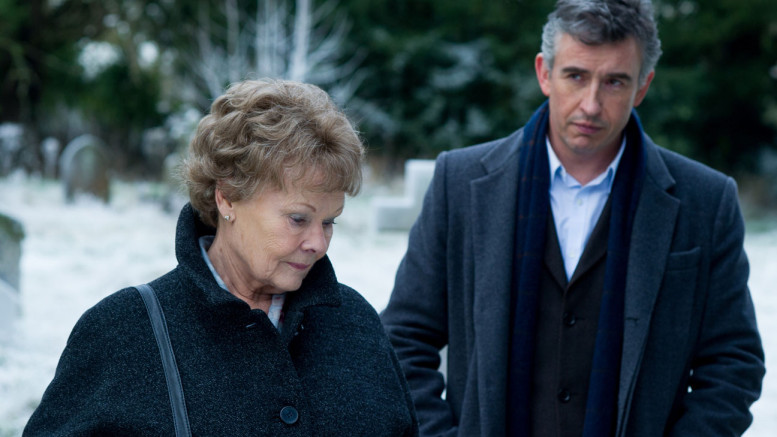As one of Britain’s greatest actresses, Dame Judi Dench has done remarkably well to stamp her ground on Hollywood during her late years especially when she secured multiple Oscar nominations (and a Best Supporting Actress win for Shakespeare in Love) between 1998 and 2007. Since then, she has mostly concentrated on smaller projects with the odd James Bond film thrown in there. However a return to award-worthy form is already on the cards as she takes on the challenging role of an elderly woman desperately searching for her loved one in Stephen Frears’ true-lift dramedy Philomena. Accompanied by the welcoming presence of Steve ‘Alan Partridge’ Coogan, laughs and tears can be expected for another potentially strong offering from the UK film industry….
SYNOPSIS: In 2002, humiliated BBC Correspondent Martin Sixsmith (Steve Coogan) hears about the story of an elderly Irish woman named Philomena Lee (Judi Dench). As a mature girl living in 1950s Ireland, she conceived a child named Anthony but he was taken away from her and placed into adoption by the cruel nuns of her convent. Fifty years on, she has vowed to track down her son and seeks Martin’s help in trying to find him. Seeing the chance of a potential headline-making story, Martin agrees to help and accompanies Philomena back to her former convent but they both learn that previous records of the adopted children were destroyed. However the pair later find out about Anthony’s possible whereabouts and descend to America not knowing whether he is alive or not with Philomena desperate for a reconciliation.
Delightfully adapted from Martin Sixsmith’s acclaimed novel The Lost Child of Philomena Lee (2009), director Stephen Frears and writer Steve Coogan set the tone for this triumphant film with a strong mixture of comedy and tragedy throughout its 110 minute running time. Straight from the outset, the laughs are brought out in the opening scene where Coogan’s Martin gives awkward answers about his health and career prospects to a concerned doctor. Humiliated by his own government, this is a man who has become so desperate to avoid the media limelight that he is prepared to write books on Russian history. In stark contrast, we have poor and weary Philomena looking sad and regretful as she reflects on her troubled past. The moments of trauma are captured effectively by the grainy use of camera-work to showcase 1950s Ireland as we witness the tough and traumatic experience that she had to go through in watching her child be taken from her. Ultimately It takes around fifteen minutes for our two leads to meet on screen (at a Harvester pub of all places!), but once that happens, both actors are able to hit it off from the word ‘go’. What makes the film most successful is the fantastic central relationship between the two leads as Dench and Coogan’s on-screen relationship brings about plenty of witty yet touching dialogue. While Philomena is more of a warm-hearted individual, Martin displays cynicism and a bit of arrogance that won’t come as a surprise to those who show a dislike to journalists! But as the film progresses, we get to see a stronger bond developed between the duo particularly when they get to Washington DC. This segment of the film produces several moments of complete hysteria from some of the cracking lines of dialogue from Coogan’s script but also instances of utter devastation as the whereabouts of Anthony are finally revealed in heartbreaking manner. Fortunately those raw scenes are eventually cut down by flashes of comedy that completely bamboozles the audiences but enables us to appreciate the dramedy factor of this film. Even when the ‘reveal’ takes place, the story doesn’t finish there as Philomena and Martin continue their quest to uncover more information about what Anthony has achieved throughout his life with Super 8 footage used to capture the realistic feel. In what is set to be a competitive year for Oscar-worthy performances, Judi Dench truly shines in her touching role as Philomena as she brings endearing warmth to a character who suffers pain throughout but also displays moments of comedy gold through her well-tinkered Irish accent. Following on from his recent success with Alan Partridge: Alpha Papa, Coogan continues to use perfect comic-timing to his advantage but also decides to go down the more endearing road of making us root for Martin particularly in the post-America scenes. Other cast members are somewhat sidelined by the two excellent leads though Anna Maxwell Martin is able to display subtlety with her role as Philomena’s concerned daughter. Plaudits should also go to renowned composer Alexandre Desplat as he creates a haunting and sombre score that showcases the tone of the film.
What does bring Philomena down a touch is its controversial ridicule of religious authority particularly towards the Catholic Church. While it may lack the shocking depiction that Peter Mullan captured in his gritty film, The Magdalene Sisters (2002), a more crowd-pleasing offering like this one is likely to cause offense as the nun characters are presented as vastly cruel and unsympathetic in both past and present sequences. The media are also presented as a little too harsh with Michelle Fairley (Game of Thrones’ Catelyn Stark) bearing the brunt as a news-hungry editor who lacks a conscience when interrogating Martin to get more out of Philomena’s story.
VERDICT: Nuns won’t appreciate it much but Stephen Frears’ wonderful film evokes the perfect blend of hilarious charm and harsh devastation in Britain’s latest cinematic triumph with Dench and Coogan a pure delight to watch together. If Oscar doesn’t reward it, then hopefully BAFTA will!


Be the first to comment on "Philomena – ★★★★ (1/2)"